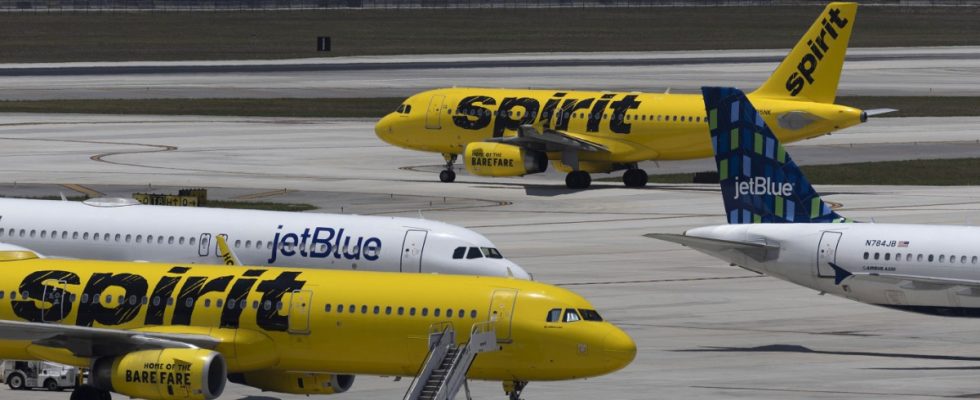When Robin Hayes became head of the American airline Jetblue Airways in 2015, he had a specific mandate from the board of directors: strong growth. So they wanted to somehow get into the top league of US airlines, which after many mergers consisted of Delta, American, United and Southwest. In 2016, he tried to buy Virgin America, but Alaska Airlines offered more money. Most recently, Hayes had to spend months in a Boston court trying to convince Judge William Young to allow a takeover of the major budget airline Spirit Airlines.
The effort was in vain. Young upheld a lawsuit by the American government and banned the transaction, arguing that it would restrict competition in the low-cost airline market too much. Investors in Spirit – headquartered in Florida – were particularly shocked: the share lost more than 60 percent of its value within a very short period of time. Jetblue shareholders were more relaxed and the shares even rose by five percent. But that probably has more to do with short-term considerations – Jetblue saves the high costs of integration.
The decision is relevant in many ways to the American airline industry, which accounts for about a third of global air traffic. The Biden government’s critical stance on consolidating air traffic is now also spreading to Europe and is having serious consequences here. Air France-KLM and the shipping company CMA CGM were forced to cancel an air freight alliance decided on in 2022 – they had not received competition approval on the North Atlantic routes.
The Boston ruling, if done badly, could have the exact opposite effect of what Judge Young wanted to achieve. Jetblue boss Hayes had argued that the Spirit takeover was necessary so that his airline could move closer to the industry giants. According to the US Department of Transportation, Jetblue has a domestic market share of 5.4 percent and Spirit 5.1 percent. For comparison: Delta is the largest provider with 17.7 percent, followed by American (17.2 percent), Southwest (16.9 percent) and Lufthansa partner United (16.1 percent). Even together, Jetblue and Spirit would only be the fifth largest airline.
Takeovers have also become more difficult in Europe
Jetblue does not see itself as a low-cost provider, but rather tries to combine comparatively cheap tickets with acceptable service. The concept is controversial among investors because it is difficult to achieve good margins. The airline is popular with passengers. Jetblue no longer has any obvious opportunities to grow quickly after the Spirit deal collapses. A merger with Alaska Airlines would be theoretically conceivable. But Alaska, currently number five in the US industry, is about to take over the smaller Hawaiian Airlines. Spirit’s management has to ask itself much more existential questions. The airline has been posting some high quarterly losses for two years.
In Europe, too, it has become more difficult for airlines to take over competitors. The European Commission must soon decide whether to allow Lufthansa to buy a large stake in ITA Airways and whether International Airlines Group (IAG) can integrate Spain’s Air Europa. If so, then only with very painful concessions, we hear. Next up is the privatization of Lufthansa partner TAP Air Portugal. Unlike in the USA, however, it is not the small or medium-sized airlines that are defending themselves better, but rather the industry leaders who want to continue to grow.
Robin Hayes won’t have anything to do with any of this anymore. The 58-year-old announced his resignation last week in mid-February – officially for health reasons.

